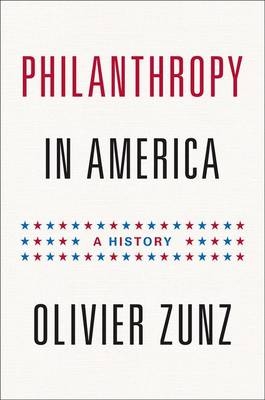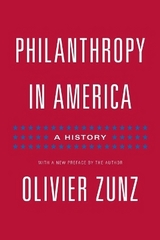
Philanthropy in America
A History
Seiten
2011
|
Revised edition
Princeton University Press (Verlag)
978-0-691-12836-8 (ISBN)
Princeton University Press (Verlag)
978-0-691-12836-8 (ISBN)
- Titel erscheint in neuer Auflage
- Artikel merken
Zu diesem Artikel existiert eine Nachauflage
American philanthropy today expands knowledge, champions social movements, defines active citizenship, influences policymaking, and addresses humanitarian crises. How did philanthropy become such a powerful and integral force in American society? This book explores the twentieth-century growth of this phenomenon.
American philanthropy today expands knowledge, champions social movements, defines active citizenship, influences policymaking, and addresses humanitarian crises. How did philanthropy become such a powerful and integral force in American society? "Philanthropy in America" is the first book to explore in depth the twentieth-century growth of this unique phenomenon. Ranging from the influential large-scale foundations established by tycoons such as John D. Rockefeller, Sr., and the mass mobilization of small donors by the Red Cross and March of Dimes, to the recent social advocacy of individuals like Bill Gates and George Soros, respected historian Olivier Zunz chronicles the tight connections between private giving and public affairs, and shows how this union has enlarged democracy and shaped history. Zunz looks at the ways in which American philanthropy emerged not as charity work, but as an open and sometimes controversial means to foster independent investigation, problem solving, and the greater good. Andrew Carnegie supported science research and higher education, catapulting these fields to a prominent position on the world stage.
In the 1950s, Howard Pew deliberately funded the young Billy Graham to counter liberal philanthropies, prefiguring the culture wars and increased philanthropic support for religious causes. And in the 1960s, the Ford Foundation supported civil rights through education, voter registration drives, and community action programs. Zunz argues that American giving allowed the country to export its ideals abroad after World War II, and he examines the federal tax policies that unified the diverse nonprofit sector. Demonstrating that America has cultivated and relied on philanthropy more than any other country, "Philanthropy in America" examines how giving for the betterment of all became embedded in the fabric of the nation's civic democracy.
American philanthropy today expands knowledge, champions social movements, defines active citizenship, influences policymaking, and addresses humanitarian crises. How did philanthropy become such a powerful and integral force in American society? "Philanthropy in America" is the first book to explore in depth the twentieth-century growth of this unique phenomenon. Ranging from the influential large-scale foundations established by tycoons such as John D. Rockefeller, Sr., and the mass mobilization of small donors by the Red Cross and March of Dimes, to the recent social advocacy of individuals like Bill Gates and George Soros, respected historian Olivier Zunz chronicles the tight connections between private giving and public affairs, and shows how this union has enlarged democracy and shaped history. Zunz looks at the ways in which American philanthropy emerged not as charity work, but as an open and sometimes controversial means to foster independent investigation, problem solving, and the greater good. Andrew Carnegie supported science research and higher education, catapulting these fields to a prominent position on the world stage.
In the 1950s, Howard Pew deliberately funded the young Billy Graham to counter liberal philanthropies, prefiguring the culture wars and increased philanthropic support for religious causes. And in the 1960s, the Ford Foundation supported civil rights through education, voter registration drives, and community action programs. Zunz argues that American giving allowed the country to export its ideals abroad after World War II, and he examines the federal tax policies that unified the diverse nonprofit sector. Demonstrating that America has cultivated and relied on philanthropy more than any other country, "Philanthropy in America" examines how giving for the betterment of all became embedded in the fabric of the nation's civic democracy.
Olivier Zunz is the Commonwealth Professor of History at the University of Virginia. He is the author of "Why the American Century?", "Making America Corporate", and "The Changing Face of Inequality".
Acknowledgments ix Introduction 1 Chapter 1: "For the Improvement of Mankind" 8 Chapter 2: The Coming of Mass Philanthropy 44 Chapter 3: The Regulatory Compromise 76 Chapter 4: The Private Funding of Affairs of State 104 Chapter 5: From Humanitarianism to Cold War 137 Chapter 6: Philanthropy at Midcentury: "Timid Billions"? 169 Chapter 7: Investing in Civil Rights 201 Chapter 8: In Search of a Nonprofit Sector 232 Chapter 9: American Philanthropy and the World's Communities 264 Conclusion 294 Notes 301 Index 351
| Erscheint lt. Verlag | 6.11.2011 |
|---|---|
| Reihe/Serie | Politics and Society in Modern America |
| Verlagsort | New Jersey |
| Sprache | englisch |
| Maße | 152 x 235 mm |
| Gewicht | 680 g |
| Themenwelt | Geschichte ► Allgemeine Geschichte ► Neuzeit (bis 1918) |
| Geisteswissenschaften ► Geschichte ► Regional- / Ländergeschichte | |
| Sozialwissenschaften ► Pädagogik ► Sozialpädagogik | |
| Sozialwissenschaften ► Soziologie | |
| ISBN-10 | 0-691-12836-7 / 0691128367 |
| ISBN-13 | 978-0-691-12836-8 / 9780691128368 |
| Zustand | Neuware |
| Haben Sie eine Frage zum Produkt? |
Mehr entdecken
aus dem Bereich
aus dem Bereich
Europa 1848/49 und der Kampf für eine neue Welt
Buch | Hardcover (2023)
DVA (Verlag)
CHF 67,20
Giordano Bruno - ein ketzerisches Leben
Buch | Hardcover (2024)
C.H.Beck (Verlag)
CHF 41,85



